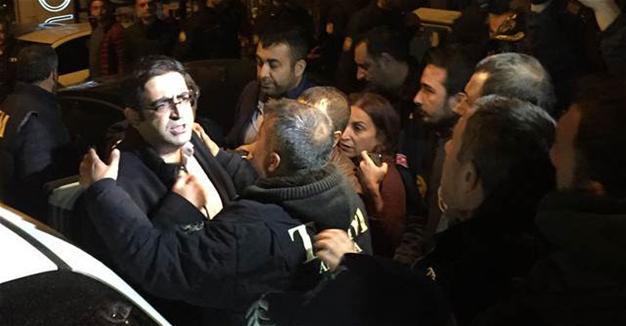Germany summons Turkish diplomat over opponent lawmakers’ arrests
BERLIN
 German Foreign Minister Frank-Walter Steinmeier has requested that the chargé d’affaires in the Turkish embassy be summoned to the ministry for discussions about Turkey’s arrests of opposition lawmakers, the German Foreign Ministry has said.
German Foreign Minister Frank-Walter Steinmeier has requested that the chargé d’affaires in the Turkish embassy be summoned to the ministry for discussions about Turkey’s arrests of opposition lawmakers, the German Foreign Ministry has said. “The overnight arrests of politicians and lawmakers from the Kurdish HDP [Peoples’ Democratic Party] represent a further drastic intensification of the situation in the eyes of the foreign minister,” the ministry said in a statement on Nov. 4, according to Reuters.
The ministry said no one questioned Ankara’s right to respond to the failed coup attempt of July 15. “But that cannot be a justification for silencing or even imprisoning the political opposition,” the statement said.
Figen Yüksekdağ and Selahattin Demirtaş, the co-leaders of the opposition HDP, and 10 lawmakers from the party were detained early on Nov. 4 as part of “terrorism” investigations carried out by prosecutor’s offices in the southeastern provinces of Diyarbakır and Şırnak and the eastern provinces of Hakkari, Van and Bingöl.
Chancellor Angela Merkel’s spokesman Steffen Seibert said the German government was “talking with our Turkish partners at all levels” about the issue.
Relations between Turkey and Germany were tense even before the lawmakers’ arrests, due to Turkish President Recep Tayyip Erdoğan’s remarks toward Merkel over her criticism of the detention of daily Cumhuriyet journalists, saying “Germany harbors terrorism.”
“They are giving us advice. But it is us who is concerned about your stance. You are aiding terror! That terror will hit you like a boomerang. We have no expectations from you, but you will be remembered by history for harboring terror,” Erdoğan said in a speech in Ankara on Nov. 3.
“We are concerned that Germany, which has been taking members of terrorist organizations such as the [outlawed Kurdistan Workers’ Party] PKK and the [Revolutionary People’s Liberation Party/Front] DHKP-C under its protection, will now become a backyard of [the Fethullahist Terror Organization] FETÖ,” he added.
Merkel on Nov. 2 said the Turkish authorities’ actions against freedom of opinion and the press were “highly alarming,” referring to the detention of senior staff, including Editor-in-Chief Murat Sabancu, columnists and a cartoonist from Cumhuriyet on Oct. 31.
Hours after Erdoğan’s remarks, Steinmeier said Nov. 3 that he could not comprehend Erdoğan’s remarks over the security situation in Germany.
“[I] cannot comprehend the comments made by Erdoğan about the security situation in Germany,” Germany’s Deutsche Welle quoted Steinmeier as saying on Nov. 3.
“Though we wish to have a close and constructive relationship with Turkey, let us not mince words. From our point of view, there are reasons to be concerned about threats to freedom of the press and freedom of opinion,” and Germany will not be silent about it, Steinmeier said.
Turkish justice minister criticizes Germany
Turkish Justice Minister Bekir Bozdağ on Nov. 4 became the latest figure to criticize Germany.
He accused Merkel and her ministers of interfering in Turkey’s justice system.
“Both Merkel and the government spokesperson thought they have right to opine on all ongoing cases,” Bozdağ said during a visit to a court in Ankara on Nov. 4.
“They have to consider Turkey as independent and sovereign and regard the Turkish justice system as being as independent and neutral as the German justice system. You cannot interfere in Turkey’s interior issues. That is not a German minister’s business,” he said.
“Neither the German chancellor nor the commissioner of Europe has the right to give Turkey a lesson. We are open to all kinds of criticisms when they start regarding Turkey objectively and independently,” he said.
Relations between the two countries deteriorated after the German Bundestag passed a bill that described as “genocide” the killing of Anatolian Armenians during World War I.
Strained relations between Ankara and Berlin due to the Armenian bill worsened after Turkey rejected a German parliamentary delegation’s visit in late June to the base, which was solved after the German government assured Turkey that the Bundestag’s decision was not binding. The German lawmakers were later allowed to visit the base.
Germany also expressed concern over the post-July 15 coup attempt crackdowns in Turkey.
















